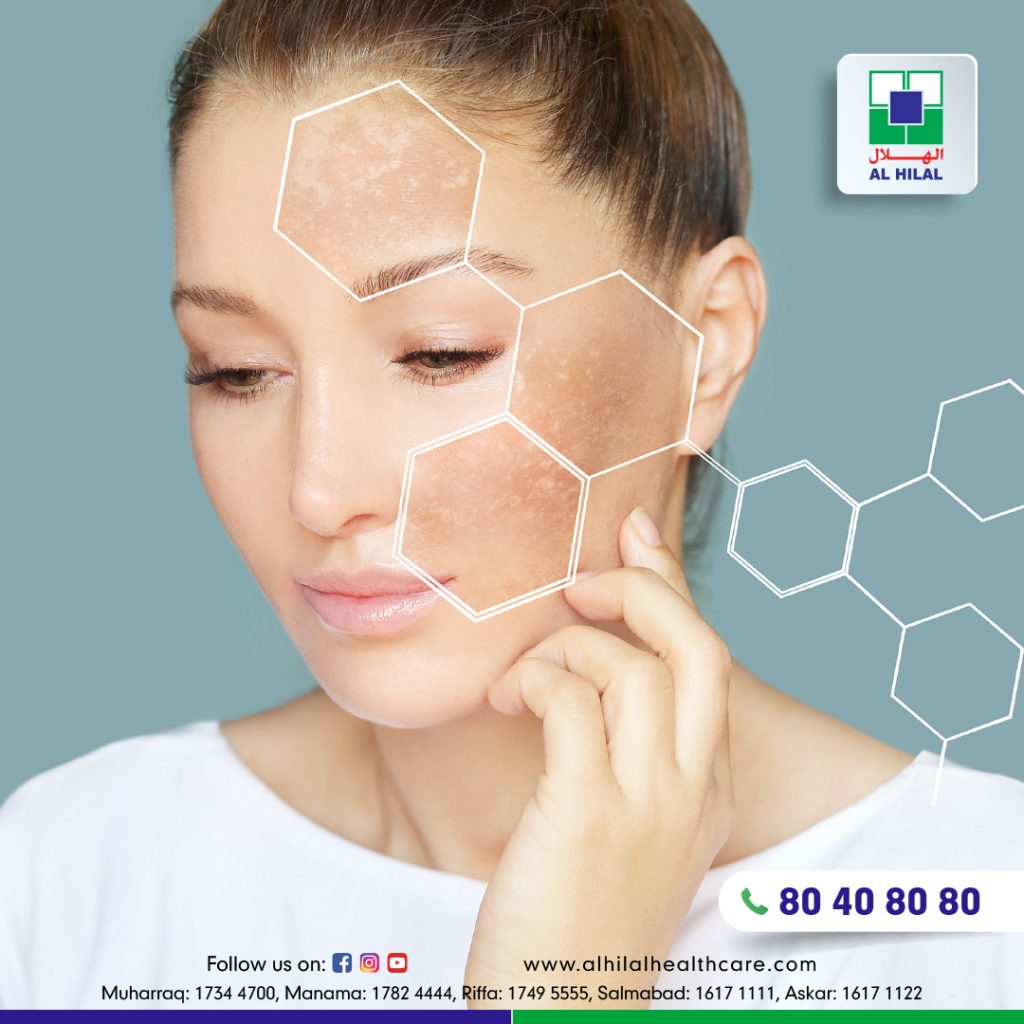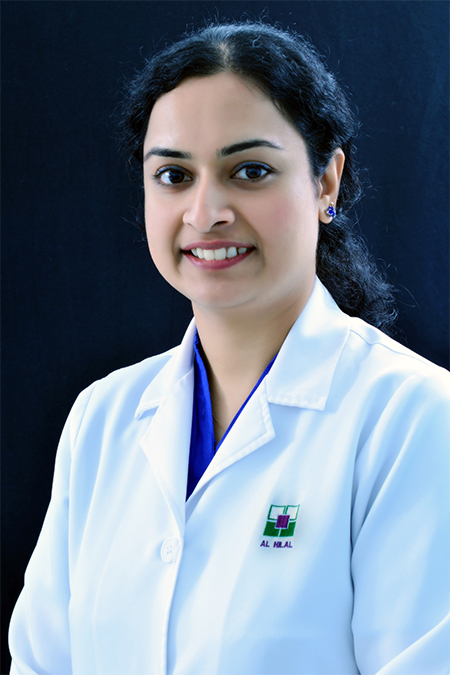Melasma is a skin condition known for causing spots and patches on skin, that are darker than the natural skin tone. Melasma on face is more common, as compared to other parts of body. Although it is a common skin condition, melasma can sometimes be mistaken for other skin conditions as well. For accurate diagnosis and individualized treatment plan, consult an expert Dermatologist and Cosmetologist at the earliest.

Al Hilal Hospital, Department of Dermatology and Cosmetology offers best dermatologist and cosmetologist in Bahrain, for consultation regarding Melasma and all other dermatological conditions.
Our representatives are available on WhatsApp helpline, in Al Hilal Manama, Salmabad, Riffa and Muharraq branches, for your convenience. We offer exclusive packages and privilege cards for additional benefits- to provide affordable yet exceptional healthcare services to all our patients.
Click here for more information regarding Dermatology and Cosmetology– by Dr. Sithara Sreedharan, Consultant Dermatologist, Al Hilal Hospital Bahrain.
Melasma in Women
Melasma is more common in women; most women get freckle-like spots and blotchy patches during pregnancy and while taking birth control pills. Melasma on face is very common during pregnancy and is known as ‘mask of pregnancy.’ It usually disappears after delivery, or when they discontinue birth control pills.
Women with medium to dark skin are at higher risk of developing melasma. When it appears, it usually causes brown, tan, bluish-grey or grayish-brown patches and freckle-like spots, that appear on certain parts of face, including forehead, cheeks, chin, and above upper lip. In some cases, it can also develop on neck, arm and elsewhere.
Melasma Symptoms
Common melasma symptoms are:
- Spots and patches darker than natural color, generally on forehead, cheeks, chin, and bridge of nose.
- Symmetrical spots or patches on both sides of face.
- Unevenly shaped patches can combine to form one large patch.
- More noticeable patches in one specific part of face.
- Melasma is not itchy or painful, but it is noticeable.
- Patches/ spots becomes more noticeable after sun exposure.
- It primarily affects women, but men can develop melasma too.
- Melasma can develop on forearms and neck too.
If you notice melasma symptoms mentioned above, contact Al Hilal Hospital, Department of Dermatology and Cosmetology for melasma treatment near me, and get an appointment with the best dermatologist and cosmetologist in Bahrain.
Our representatives are available on WhatsApp helpline, in Al Hilal Manama, Salmabad, Riffa and Muharraq branches, for your convenience.
Melasma Causes
The major melasma causes are:
- Radiation: including visible light, ultraviolet and infrared light (heat).
- Hormones
Other potential melasma causes include:
- Radiation: including visible light, ultraviolet and infrared light (heat).
- Hormones.
- Other potential melasma causes include:
- Antiseizure medication.
- Contraceptive therapy (Birth control).
- Diethylstilbestrol/ Estrogen.
- Genetics.
- Tanning beds.
- Hypothyroidism.
- LED screens.
- Phototoxic drugs (medicines that increase light sensitivity).
- Cosmetics (makeup).
- Pregnancy.
- Hormones.
- Skincare products.
- Soaps.
Click here for more information about Dermatology and Cosmetology– by Dr. Sithara Sreedharan, Consultant Dermatologist, Al Hilal Hospital Bahrain.
Melasma Treatment
Melasma treatment is not always necessary- if melasma is caused by hormonal changes (during pregnancy and while taking birth control), it goes away once the baby is delivered or when the medication is discontinued. If it does not fade with time, treatment might be required to fade or remove the patches. However, melasma might come back after a successful treatment and treatment methods might not work for everyone.
If you are looking for melasma treatment near me, contact Al Hilal Hospital, Department of Dermatology and Cosmetology, and get consultation with the best dermatologist/ cosmetologist in Bahrain.
Commonly used melasma treatment options include:
- Corticosteroids and tretinoin.
- Combination of melasma treatment cream.
- Additional topical medication (melasma treatment cream).
- Medical procedure (chemical peel, microdermabrasion, laser treatment, dermabrasion, and light therapy)
Melasma Treatment at Home
Following products can be used for melasma treatment at home:
- Apple cider vinegar- contains acetic acid that lightens pigments.
- Aloe vera- contains aloin.
- Red onion- dried skin of red onion can lighten the skin.
- Green tea extract- has depigmentation effect.
- Black tea water- lightens dark spots.
- Licorice extract- contains active ingredients that lighten hyperpigmentation.
- Milk, sour milk, and buttermilk- lighten skin discoloration.
- Tomato paste- rich in lycopene that protects skin against photo damage.
- Orchid extracts- improve appearance and size of dark patches.
Al Hilal Hospital Bahrain, Department of Dermatology & Cosmetology
For more information about melasma and other dermatological diseases, consult an expert dermatologist/ cosmetologist. At Al Hilal Hospital, Department of Dermatology and Cosmetology, we have experienced and highly qualified doctors, state-of-the-art laboratories and modern equipment, to provide early detection and treatment options for all the patients.
Get in touch with Al Hilal Hospital today, and get consultation with the best dermatologist and cosmetologist in Bahrain for early diagnosis and treatment of melasma and other dermatological issues. For your convenience, our representatives are available on WhatsApp helpline, in Al Hilal Manama, Salmabad, Riffa and Muharraq branches. We also offer exclusive packages and privilege cards for additional benefits, to provide affordable yet exceptional healthcare services to all our patients.


